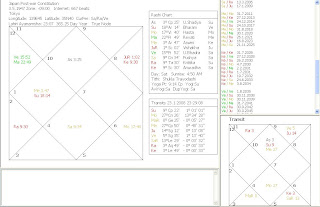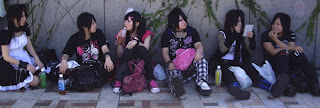 An authentic mundane horoscope for Japan has long been sought in astrological circles. Recently, the vedic astrologer V. K. Choudhry suggested that the Post-War Constitution Chart (PWC chart) "appears to be the right chart for Japan".
An authentic mundane horoscope for Japan has long been sought in astrological circles. Recently, the vedic astrologer V. K. Choudhry suggested that the Post-War Constitution Chart (PWC chart) "appears to be the right chart for Japan".In The Book of World Horoscopes by Nicholas Campion (1996 ed.) it is stated that "Horoscopes for modern Japan are also set for the revival of the country following the defeat in the second world war in 1945, and its occupation by the USA" Campion mentions that the post-war constitution came into effect "apparently at 0.00 hrs on 3 May 1947 in Tokyo". The constitution was "promulgated on 3 November 1946, and formally presented to the Diet (parliament) by the Emperor in the morning [of 3 May] and marked by ceremonies in the afternoon."
Capricorn in the ascendant
First let us review some of the things Professor Choudhry has written about the sign Capricorn when rising in the ascendant and consider it in terms of a mundane chart:
“The sign Capricorn is ruled by Saturn. It is a negative, non-human, earthy and semi-fruitful sign. Capricornians are social as Venus rules their tenth house. They are conservative, selfish and selective in approach. They are secretive, pensive, organised, proud and fastidious. They are vigilant and tactful. They have compromising nature in order to achieve leadership.
The major stress area is the fluctuating status of their own fortune as Mercury, the planet of fluctuations, rules the ninth house of Capricornians. They long for leadership, political power, practice of law and business. Their major pursuits in life include acquisition of assets, partnerships and social contacts for personal benefits and selfish ends.
The significator for the soul, the Sun and significator for morality and generosity, Jupiter, are functional malefics for Capricornians. The strong Sun and Jupiter ensure a happy and harmonious married life and Capricornians prefer enjoying a comfortable life.
The mooltrikona sign of Mars is in the fourth house, and the strength of Mars in its period governs the acquisition of assets, good education, alertness and passionate married life. One gets happiness from long-lived mother when Mars is strong."
A strong Moon assures good success in foreign policy. As stated above, a major stress area is the ninth house, where mooltrikona sign of weakness prone Mercury falls. "The sign Libra of Venus plays a major role in the life of Capricornians, as their professional success is dependant on the good strength of Venus."
First let us review some of the things Professor Choudhry has written about the sign Capricorn when rising in the ascendant and consider it in terms of a mundane chart:
“The sign Capricorn is ruled by Saturn. It is a negative, non-human, earthy and semi-fruitful sign. Capricornians are social as Venus rules their tenth house. They are conservative, selfish and selective in approach. They are secretive, pensive, organised, proud and fastidious. They are vigilant and tactful. They have compromising nature in order to achieve leadership.
The major stress area is the fluctuating status of their own fortune as Mercury, the planet of fluctuations, rules the ninth house of Capricornians. They long for leadership, political power, practice of law and business. Their major pursuits in life include acquisition of assets, partnerships and social contacts for personal benefits and selfish ends.
The significator for the soul, the Sun and significator for morality and generosity, Jupiter, are functional malefics for Capricornians. The strong Sun and Jupiter ensure a happy and harmonious married life and Capricornians prefer enjoying a comfortable life.
The mooltrikona sign of Mars is in the fourth house, and the strength of Mars in its period governs the acquisition of assets, good education, alertness and passionate married life. One gets happiness from long-lived mother when Mars is strong."
A strong Moon assures good success in foreign policy. As stated above, a major stress area is the ninth house, where mooltrikona sign of weakness prone Mercury falls. "The sign Libra of Venus plays a major role in the life of Capricornians, as their professional success is dependant on the good strength of Venus."
Placements in the PWC chart
 Now lets us look at the chart based on the given time. First we see that 2nd lord SATURN is placed at 9° 34' Cancer in the 7th house of foreign policy. The Japanese people would be concerned with foreign policy and their place in the world. The dispositor of Saturn is the 7th lord MOON, which is placed at 17° 40' Virgo H9. This is a lucky placement. Moreover, Moon is under aspect from exalted 10th lord VENUS at 15° 50' Pisces H3. This suggests that foreign policy is closely connected with foreign trade. Next we consider the dispositor of the Moon, 9th lord MERCURY. It is at 3° 47' Aries H4 and thus has 75% strength. As Mercury is on the rising degree it is favourably aspecting the 4th and 10th houses. This ties the indications of the 7th house and 10th house closer together, but is also indicates good luck with regard to natural resources, fixed properties and social stability on the one hand and foreign trade and executive government on the other. However, given the slight weakness of Mercury in infancy, Saturn only enjoys 75% strength on account of its strength depending on its final dispositor, Mercury. Now we consider two additional influences on Saturn, namely the close aspect of KETU at 9° 30' Scorpio in the 11th house. This adds a pronounced separative influence to the status and ties with neighboring countries. Indeed, Japan is at odds with its closest neighbors China and Korea (both South and North), due to hard experiences in World War II and different political systems, notably in China. Moreover, Japan does not enjoy as active a role in foreign policy as its population size (around 100 million people) and significant economic power could suggest. Rather, Japan often seems to act as a silent partner to the USA in world affairs. Finally, with regard to Saturn, we can note that 12th lord Jupiter at 1° 02' Scorpio in the 11th house, is on the most effective point and thus afflicts the 7th house MEP, wherein Saturn resides. This adds weakness to Saturn and adds a further separative energy to the 7th house and notably Saturn. This may help to explain why Japan
Now lets us look at the chart based on the given time. First we see that 2nd lord SATURN is placed at 9° 34' Cancer in the 7th house of foreign policy. The Japanese people would be concerned with foreign policy and their place in the world. The dispositor of Saturn is the 7th lord MOON, which is placed at 17° 40' Virgo H9. This is a lucky placement. Moreover, Moon is under aspect from exalted 10th lord VENUS at 15° 50' Pisces H3. This suggests that foreign policy is closely connected with foreign trade. Next we consider the dispositor of the Moon, 9th lord MERCURY. It is at 3° 47' Aries H4 and thus has 75% strength. As Mercury is on the rising degree it is favourably aspecting the 4th and 10th houses. This ties the indications of the 7th house and 10th house closer together, but is also indicates good luck with regard to natural resources, fixed properties and social stability on the one hand and foreign trade and executive government on the other. However, given the slight weakness of Mercury in infancy, Saturn only enjoys 75% strength on account of its strength depending on its final dispositor, Mercury. Now we consider two additional influences on Saturn, namely the close aspect of KETU at 9° 30' Scorpio in the 11th house. This adds a pronounced separative influence to the status and ties with neighboring countries. Indeed, Japan is at odds with its closest neighbors China and Korea (both South and North), due to hard experiences in World War II and different political systems, notably in China. Moreover, Japan does not enjoy as active a role in foreign policy as its population size (around 100 million people) and significant economic power could suggest. Rather, Japan often seems to act as a silent partner to the USA in world affairs. Finally, with regard to Saturn, we can note that 12th lord Jupiter at 1° 02' Scorpio in the 11th house, is on the most effective point and thus afflicts the 7th house MEP, wherein Saturn resides. This adds weakness to Saturn and adds a further separative energy to the 7th house and notably Saturn. This may help to explain why Japan  has become gouped with the Western countries due to its economic might and political arrangements although in geographic and historical terms it is very different. Moreover, these complex placements suggest the foreign policy is hampered by setbacks or limitations. Since WWII, the international community has not allowed Japan to have a strong military.
has become gouped with the Western countries due to its economic might and political arrangements although in geographic and historical terms it is very different. Moreover, these complex placements suggest the foreign policy is hampered by setbacks or limitations. Since WWII, the international community has not allowed Japan to have a strong military.
The key strength of Japan is the placement of its 4th lord, MARS, at 22° 49' Pisces in the 3rd house along with exalted 10th lord Venus. With both 4th and 10th lords in the 3rd house, Japan favours foreign trade in high tech goods and derives considerable satisfaction from new inititiatives. This placement suggests the business sector is quite dynamic. This is attested by the fact that some of the best known global brand names come from Japan, including Toyota, Sony, Yamaha and Mitsubishi. Many nice artists, including singers, musicians and filmmakers, hail from this country.
The SUN as 8th lord, is strong at 18° 14' Aries H4 and it is unafflicted. This suggests the leader of the country has an important role to facilitate the social harmony. At the same time, as it is 8th lord, there could be some obstacles to 4th house indications, such as real estate, natural resources or social harmony. However, as Sun is not on the most effective point on the house and is not afflicting or afflicted in the chart, the influence is not great.
 As 12th lord, JUPITER is placed on the MEP of the 11th house, there could be losses to the sources of income. This influence could also mean that the nation has a sense of loss involving its national aspirations (unlike e.g. the USA which has L1 Moon strong in H11 and has a strong sense of accomplishment with respect to its aspirations). With Ketu in the 11th house, the sources of income or aspirations could be unusual. With RAHU in the 5th house, the children would be worldly and there could be problems in this area due to aspect of Jupiter. With Jupiter as 12th lord on H11 MEP and aspecting H5, there would likely be a sense of young people not feeling a part of adult Japanese society. The fashion trends of Japanese teens seem to reflect the influence of Rahu and 12th lord on the 5th house. As Jupiter is also an indicator of religion, these placements may also explain the emergence of a cult of young people who tried to harm ordinary people by gasing the subways (12th lord Jupiter also aspects the 3rd house).
As 12th lord, JUPITER is placed on the MEP of the 11th house, there could be losses to the sources of income. This influence could also mean that the nation has a sense of loss involving its national aspirations (unlike e.g. the USA which has L1 Moon strong in H11 and has a strong sense of accomplishment with respect to its aspirations). With Ketu in the 11th house, the sources of income or aspirations could be unusual. With RAHU in the 5th house, the children would be worldly and there could be problems in this area due to aspect of Jupiter. With Jupiter as 12th lord on H11 MEP and aspecting H5, there would likely be a sense of young people not feeling a part of adult Japanese society. The fashion trends of Japanese teens seem to reflect the influence of Rahu and 12th lord on the 5th house. As Jupiter is also an indicator of religion, these placements may also explain the emergence of a cult of young people who tried to harm ordinary people by gasing the subways (12th lord Jupiter also aspects the 3rd house).
 Now lets us look at the chart based on the given time. First we see that 2nd lord SATURN is placed at 9° 34' Cancer in the 7th house of foreign policy. The Japanese people would be concerned with foreign policy and their place in the world. The dispositor of Saturn is the 7th lord MOON, which is placed at 17° 40' Virgo H9. This is a lucky placement. Moreover, Moon is under aspect from exalted 10th lord VENUS at 15° 50' Pisces H3. This suggests that foreign policy is closely connected with foreign trade. Next we consider the dispositor of the Moon, 9th lord MERCURY. It is at 3° 47' Aries H4 and thus has 75% strength. As Mercury is on the rising degree it is favourably aspecting the 4th and 10th houses. This ties the indications of the 7th house and 10th house closer together, but is also indicates good luck with regard to natural resources, fixed properties and social stability on the one hand and foreign trade and executive government on the other. However, given the slight weakness of Mercury in infancy, Saturn only enjoys 75% strength on account of its strength depending on its final dispositor, Mercury. Now we consider two additional influences on Saturn, namely the close aspect of KETU at 9° 30' Scorpio in the 11th house. This adds a pronounced separative influence to the status and ties with neighboring countries. Indeed, Japan is at odds with its closest neighbors China and Korea (both South and North), due to hard experiences in World War II and different political systems, notably in China. Moreover, Japan does not enjoy as active a role in foreign policy as its population size (around 100 million people) and significant economic power could suggest. Rather, Japan often seems to act as a silent partner to the USA in world affairs. Finally, with regard to Saturn, we can note that 12th lord Jupiter at 1° 02' Scorpio in the 11th house, is on the most effective point and thus afflicts the 7th house MEP, wherein Saturn resides. This adds weakness to Saturn and adds a further separative energy to the 7th house and notably Saturn. This may help to explain why Japan
Now lets us look at the chart based on the given time. First we see that 2nd lord SATURN is placed at 9° 34' Cancer in the 7th house of foreign policy. The Japanese people would be concerned with foreign policy and their place in the world. The dispositor of Saturn is the 7th lord MOON, which is placed at 17° 40' Virgo H9. This is a lucky placement. Moreover, Moon is under aspect from exalted 10th lord VENUS at 15° 50' Pisces H3. This suggests that foreign policy is closely connected with foreign trade. Next we consider the dispositor of the Moon, 9th lord MERCURY. It is at 3° 47' Aries H4 and thus has 75% strength. As Mercury is on the rising degree it is favourably aspecting the 4th and 10th houses. This ties the indications of the 7th house and 10th house closer together, but is also indicates good luck with regard to natural resources, fixed properties and social stability on the one hand and foreign trade and executive government on the other. However, given the slight weakness of Mercury in infancy, Saturn only enjoys 75% strength on account of its strength depending on its final dispositor, Mercury. Now we consider two additional influences on Saturn, namely the close aspect of KETU at 9° 30' Scorpio in the 11th house. This adds a pronounced separative influence to the status and ties with neighboring countries. Indeed, Japan is at odds with its closest neighbors China and Korea (both South and North), due to hard experiences in World War II and different political systems, notably in China. Moreover, Japan does not enjoy as active a role in foreign policy as its population size (around 100 million people) and significant economic power could suggest. Rather, Japan often seems to act as a silent partner to the USA in world affairs. Finally, with regard to Saturn, we can note that 12th lord Jupiter at 1° 02' Scorpio in the 11th house, is on the most effective point and thus afflicts the 7th house MEP, wherein Saturn resides. This adds weakness to Saturn and adds a further separative energy to the 7th house and notably Saturn. This may help to explain why Japan  has become gouped with the Western countries due to its economic might and political arrangements although in geographic and historical terms it is very different. Moreover, these complex placements suggest the foreign policy is hampered by setbacks or limitations. Since WWII, the international community has not allowed Japan to have a strong military.
has become gouped with the Western countries due to its economic might and political arrangements although in geographic and historical terms it is very different. Moreover, these complex placements suggest the foreign policy is hampered by setbacks or limitations. Since WWII, the international community has not allowed Japan to have a strong military.The key strength of Japan is the placement of its 4th lord, MARS, at 22° 49' Pisces in the 3rd house along with exalted 10th lord Venus. With both 4th and 10th lords in the 3rd house, Japan favours foreign trade in high tech goods and derives considerable satisfaction from new inititiatives. This placement suggests the business sector is quite dynamic. This is attested by the fact that some of the best known global brand names come from Japan, including Toyota, Sony, Yamaha and Mitsubishi. Many nice artists, including singers, musicians and filmmakers, hail from this country.
The SUN as 8th lord, is strong at 18° 14' Aries H4 and it is unafflicted. This suggests the leader of the country has an important role to facilitate the social harmony. At the same time, as it is 8th lord, there could be some obstacles to 4th house indications, such as real estate, natural resources or social harmony. However, as Sun is not on the most effective point on the house and is not afflicting or afflicted in the chart, the influence is not great.
 As 12th lord, JUPITER is placed on the MEP of the 11th house, there could be losses to the sources of income. This influence could also mean that the nation has a sense of loss involving its national aspirations (unlike e.g. the USA which has L1 Moon strong in H11 and has a strong sense of accomplishment with respect to its aspirations). With Ketu in the 11th house, the sources of income or aspirations could be unusual. With RAHU in the 5th house, the children would be worldly and there could be problems in this area due to aspect of Jupiter. With Jupiter as 12th lord on H11 MEP and aspecting H5, there would likely be a sense of young people not feeling a part of adult Japanese society. The fashion trends of Japanese teens seem to reflect the influence of Rahu and 12th lord on the 5th house. As Jupiter is also an indicator of religion, these placements may also explain the emergence of a cult of young people who tried to harm ordinary people by gasing the subways (12th lord Jupiter also aspects the 3rd house).
As 12th lord, JUPITER is placed on the MEP of the 11th house, there could be losses to the sources of income. This influence could also mean that the nation has a sense of loss involving its national aspirations (unlike e.g. the USA which has L1 Moon strong in H11 and has a strong sense of accomplishment with respect to its aspirations). With Ketu in the 11th house, the sources of income or aspirations could be unusual. With RAHU in the 5th house, the children would be worldly and there could be problems in this area due to aspect of Jupiter. With Jupiter as 12th lord on H11 MEP and aspecting H5, there would likely be a sense of young people not feeling a part of adult Japanese society. The fashion trends of Japanese teens seem to reflect the influence of Rahu and 12th lord on the 5th house. As Jupiter is also an indicator of religion, these placements may also explain the emergence of a cult of young people who tried to harm ordinary people by gasing the subways (12th lord Jupiter also aspects the 3rd house).Interestingly, the affliction of L2 Saturn by Ketu suggests sudden even violent events disrupting the wealth and status of the nation. The affliction of the 11th and 7th, 5th and 3rd house by the 12th lord of losses subjects the country to losses in income, foreign policy, speculation and new business enterprises. In short, the chart seems to offer sufficient potential for explaining disruptions to the economic life.
Notable events
Let´s examine a few notable events with respect to transit and period influences.
The Crash of 1990
Let´s examine a few notable events with respect to transit and period influences.
The Crash of 1990
In May 1989, the Bank of Japan began to raise its discount rate from 2.5% to counter a perceived threat of inflation. The original rate had helped propel the Nikkei 225 index from 11,500 as recently as 1984 to about 38,900 by late 1989. On Dec 31, 1989, the Japanese Nikkei Index peaked at 38,915 (when the DJIA was at 2753). The Nikkei index fell below 9,000 by 2002, shedding over 75% of its peak value. The discount interest rate stood at 6.0% by the end of 1990, which shows that the central bank of Japan was too late in reducing the rate, when the crisis was unfolding, increasing its severity, entrenchment and hence duration.
Natal potential: L12 Jupiter in infancy afflicting the most effective point of the 11th house and L2 Saturn is weak and severely afflicted in the 7th house. Period incluences: the Jupiter major period and Mars sub-period were operating. With Jupite influence there would be losses associated with income and speculation. With 4th lord Mars placed in the 3rd house, there would be contentment from new initiatives.
Transit influences: When the market crash began, transit L12 Jupiter was in the 6th house of financial stability. Meanwhile, L2 Saturn was transiting the 12th house with 8th lord Sun. Transit Ketu was in the 7th house exactly aspecting Mars in the 3rd house. The streak of optimsim and faith in an ever rising income was suddenly broken and the market crashed in the month of January - with the Nikkei sagging for many years.
The Kobe earthquake of 1995
 This earthquake is better known in Japan as the Great Hanshin Earthquake. It measured 7.2 on the Richter magnitude scale. It struck at 5:47 a.m. on Tuesday, January 17, 1995 in the southern part of Hyogo Prefecture and lasted for approximately 20 seconds. The focus of the earthquake was located 16 km beneath its epicenter, on the northern end of Awaji Island, 20 km away from the city of Kobe with its population of 1.5 million. This is in the middle of the fault zone of the Pacific, Eurasian and Philippine tectonic plates.
This earthquake is better known in Japan as the Great Hanshin Earthquake. It measured 7.2 on the Richter magnitude scale. It struck at 5:47 a.m. on Tuesday, January 17, 1995 in the southern part of Hyogo Prefecture and lasted for approximately 20 seconds. The focus of the earthquake was located 16 km beneath its epicenter, on the northern end of Awaji Island, 20 km away from the city of Kobe with its population of 1.5 million. This is in the middle of the fault zone of the Pacific, Eurasian and Philippine tectonic plates.
Natal potential: Sun as 8th lord is placed in the 4th house of real estate. Ketu afflicts closely the 2nd lord of wealth Saturn, also a general indicator of structures.
Period: Saturn major period and Saturn sub-period were operating.
Transit influences: transit Ketu was closely conjunct 8th lord Sun, while transit Rahu was closely aspecting transit Saturn in the 2nd house. Transit 8th lord Sun was exactly conjunct the most effective point of the 1st house. Transit Moon in 7th house was under close aspect of natal 12th lord Jupiter. Meanwhile transit Jupiter in the 11th house was closely conjunct 10th lord Venus. Last but not least, 4th lord Mars was transiting the 8th house of obstacles.
In view of the above indications of natal potential and the match with two major events in the modern history of Japan, the study of this chart certainly begins with promise.
Natal potential: L12 Jupiter in infancy afflicting the most effective point of the 11th house and L2 Saturn is weak and severely afflicted in the 7th house. Period incluences: the Jupiter major period and Mars sub-period were operating. With Jupite influence there would be losses associated with income and speculation. With 4th lord Mars placed in the 3rd house, there would be contentment from new initiatives.
Transit influences: When the market crash began, transit L12 Jupiter was in the 6th house of financial stability. Meanwhile, L2 Saturn was transiting the 12th house with 8th lord Sun. Transit Ketu was in the 7th house exactly aspecting Mars in the 3rd house. The streak of optimsim and faith in an ever rising income was suddenly broken and the market crashed in the month of January - with the Nikkei sagging for many years.
The Kobe earthquake of 1995
 This earthquake is better known in Japan as the Great Hanshin Earthquake. It measured 7.2 on the Richter magnitude scale. It struck at 5:47 a.m. on Tuesday, January 17, 1995 in the southern part of Hyogo Prefecture and lasted for approximately 20 seconds. The focus of the earthquake was located 16 km beneath its epicenter, on the northern end of Awaji Island, 20 km away from the city of Kobe with its population of 1.5 million. This is in the middle of the fault zone of the Pacific, Eurasian and Philippine tectonic plates.
This earthquake is better known in Japan as the Great Hanshin Earthquake. It measured 7.2 on the Richter magnitude scale. It struck at 5:47 a.m. on Tuesday, January 17, 1995 in the southern part of Hyogo Prefecture and lasted for approximately 20 seconds. The focus of the earthquake was located 16 km beneath its epicenter, on the northern end of Awaji Island, 20 km away from the city of Kobe with its population of 1.5 million. This is in the middle of the fault zone of the Pacific, Eurasian and Philippine tectonic plates.Natal potential: Sun as 8th lord is placed in the 4th house of real estate. Ketu afflicts closely the 2nd lord of wealth Saturn, also a general indicator of structures.
Period: Saturn major period and Saturn sub-period were operating.
Transit influences: transit Ketu was closely conjunct 8th lord Sun, while transit Rahu was closely aspecting transit Saturn in the 2nd house. Transit 8th lord Sun was exactly conjunct the most effective point of the 1st house. Transit Moon in 7th house was under close aspect of natal 12th lord Jupiter. Meanwhile transit Jupiter in the 11th house was closely conjunct 10th lord Venus. Last but not least, 4th lord Mars was transiting the 8th house of obstacles.
In view of the above indications of natal potential and the match with two major events in the modern history of Japan, the study of this chart certainly begins with promise.
Early 2008
The present period and transit influences in the chart are interesting. The Saturn major period and Rahu sub-period are running. Rahu is strong and unafflicted and unafflicting in the chart. This suggests there would be worldly progress with regard to 5th house indications. The transits at the present time are, however not easy. Rahu is stationary conjunct the most effective point of the 2nd house of wealth and status, while afflicting the 6th house of financial stability, 8th house of obstacles and 10th house of foreign trade. Meanwhile transit Ketu is afflicting the 8th house, 12th house, 2nd house and 4th house. Ketu is also afflicting 9th lord, Mercury, ruling the "judicial system, morality, religion, diplomats, foreign missions and progress and development." Mercury is also indicator of "strategists, advisors to head of state and intellectuals." This suggests that sudden obstacles will take place with such indications. Moreover, the transit station of the nodes would be especially difficult as 2nd lord Saturn is now transiting the 8th house of obstacles. Hence, we would expect to see setbacks to the 2nd house indications, including such indications as the "national wealth, status and relationships within country and with neighbors, the purchasing power of the people, financial stability, national income, strength of currency, budget and balance of trade." Indeed, the Nikkei average has in recent weeks fallen very steeply. As the nodes will remain stationary until late March, the situation would be expected to remain especially difficult for Japan during this time. Adding to the strain is transit of 4th lord Mars through Gemini and 6th house under affliction now by Rahu in the 2nd house. The 4th house rules the "nation's natural resources, agriculture, mines, minerals, landed properties, peace, general and political stability, natural calamities, educational institutions, law and order, housing and communal harmony." Moreover, the transit of 10th lord Venus through the 12th house, also currently under the aspect of Ketu in the 8th house, would suggest a setback for foreign trade. Finally, as Jupiter is in its own 12th house, there would be less problems in foreign countries at the present time. In recent days, the situation would also have been aggravated by the transit of 8th lord Sun in Capricorn into the aspect of natal Rahu in the 5th house.
References
The present period and transit influences in the chart are interesting. The Saturn major period and Rahu sub-period are running. Rahu is strong and unafflicted and unafflicting in the chart. This suggests there would be worldly progress with regard to 5th house indications. The transits at the present time are, however not easy. Rahu is stationary conjunct the most effective point of the 2nd house of wealth and status, while afflicting the 6th house of financial stability, 8th house of obstacles and 10th house of foreign trade. Meanwhile transit Ketu is afflicting the 8th house, 12th house, 2nd house and 4th house. Ketu is also afflicting 9th lord, Mercury, ruling the "judicial system, morality, religion, diplomats, foreign missions and progress and development." Mercury is also indicator of "strategists, advisors to head of state and intellectuals." This suggests that sudden obstacles will take place with such indications. Moreover, the transit station of the nodes would be especially difficult as 2nd lord Saturn is now transiting the 8th house of obstacles. Hence, we would expect to see setbacks to the 2nd house indications, including such indications as the "national wealth, status and relationships within country and with neighbors, the purchasing power of the people, financial stability, national income, strength of currency, budget and balance of trade." Indeed, the Nikkei average has in recent weeks fallen very steeply. As the nodes will remain stationary until late March, the situation would be expected to remain especially difficult for Japan during this time. Adding to the strain is transit of 4th lord Mars through Gemini and 6th house under affliction now by Rahu in the 2nd house. The 4th house rules the "nation's natural resources, agriculture, mines, minerals, landed properties, peace, general and political stability, natural calamities, educational institutions, law and order, housing and communal harmony." Moreover, the transit of 10th lord Venus through the 12th house, also currently under the aspect of Ketu in the 8th house, would suggest a setback for foreign trade. Finally, as Jupiter is in its own 12th house, there would be less problems in foreign countries at the present time. In recent days, the situation would also have been aggravated by the transit of 8th lord Sun in Capricorn into the aspect of natal Rahu in the 5th house.
References

No comments:
Post a Comment